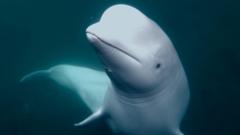A new investigation led by marine experts has shed light on Hvaldimir, believed to have fled a Russian Arctic military program. While formerly considered a 'spy whale,' it is now thought Hvaldimir was trained primarily as a guard and ultimately swam to freedom.
The Tale of Hvaldimir: Unraveling the Mystery of the Escaped Beluga 'Spy Whale'

The Tale of Hvaldimir: Unraveling the Mystery of the Escaped Beluga 'Spy Whale'
After years of speculation, marine scientists reveal that Hvaldimir, the beluga whale seen off Norway, likely escaped from a Russian military program intended for guarding purposes, but not espionage.
Despite years of speculation regarding the origins of Hvaldimir, the beluga whale who captivated Norway, marine biologists have developed a clearer picture of the creature's journey. Initially discovered off Norway’s coast in 2019 clad with a harness bearing the words “Equipment St Petersburg,” Hvaldimir quickly became central to theories suggesting it was a Russian military spy. However, Dr. Olga Shpak, a marine mammal expert with roots in Ukraine, asserts that this notion may be erroneous. According to Dr. Shpak, who depicted her insights in a BBC documentary titled "Secrets of the Spy Whale," Hvaldimir likely escaped from a military facility where it was conditioned to assist with base security rather than espionage.
Potentially trained by Russian authorities to guard a naval base in the Arctic, Dr. Shpak believes Hvaldimir exhibited behavior indicative of a creature that fled due to its “hooligan” nature. “For me, it’s 100% certain,” Dr. Shpak stated, referencing her discussions with former colleagues concerning the beluga’s past. While Russian authorities have maintained silence regarding this claim, satellite imagery has unveiled pens near the Murmansk naval base, which some speculate might have housed Hvaldimir’s counterparts.
Witnesses describe Hvaldimir's early interactions with local fishermen as peculiar; appearing overly friendly and struggling to catch fish, it showcased training that conditioned it to interact with any noticeable targets. This interaction led to widespread affection and concern among the locals, who swiftly took it upon themselves to monitor and care for the beluga. The name Hvaldimir, an amalgamation of "hval," meaning whale in Norwegian, and the surname of President Vladimir Putin, emerged from this collective curiosity.
Dr. Shpak indicated that this whale was initially captured in the Sea of Okhotsk and later moved into the military program. She suggested that while initially trained well, possibly due to its lively personality, it ultimately opted for freedom over following commands. After a few years of thriving in the wild, Hvaldimir's life ended tragically in September 2024, when a post-mortem examination revealed its demise was caused by an unfortunate accident involving an object lodged in its mouth, rather than any direct human act.
This extraordinary yet tragic tale underscores the complex relationship between marine mammals and military endeavors, as well as the intricate behaviors they possess when freed from captivity. As communities continue to reflect on Hvaldimir’s time within human society, conversations on the ethical treatment of these intelligent creatures persist, emphasizing a need for deeper understanding of their behavioral and environmental needs.
Potentially trained by Russian authorities to guard a naval base in the Arctic, Dr. Shpak believes Hvaldimir exhibited behavior indicative of a creature that fled due to its “hooligan” nature. “For me, it’s 100% certain,” Dr. Shpak stated, referencing her discussions with former colleagues concerning the beluga’s past. While Russian authorities have maintained silence regarding this claim, satellite imagery has unveiled pens near the Murmansk naval base, which some speculate might have housed Hvaldimir’s counterparts.
Witnesses describe Hvaldimir's early interactions with local fishermen as peculiar; appearing overly friendly and struggling to catch fish, it showcased training that conditioned it to interact with any noticeable targets. This interaction led to widespread affection and concern among the locals, who swiftly took it upon themselves to monitor and care for the beluga. The name Hvaldimir, an amalgamation of "hval," meaning whale in Norwegian, and the surname of President Vladimir Putin, emerged from this collective curiosity.
Dr. Shpak indicated that this whale was initially captured in the Sea of Okhotsk and later moved into the military program. She suggested that while initially trained well, possibly due to its lively personality, it ultimately opted for freedom over following commands. After a few years of thriving in the wild, Hvaldimir's life ended tragically in September 2024, when a post-mortem examination revealed its demise was caused by an unfortunate accident involving an object lodged in its mouth, rather than any direct human act.
This extraordinary yet tragic tale underscores the complex relationship between marine mammals and military endeavors, as well as the intricate behaviors they possess when freed from captivity. As communities continue to reflect on Hvaldimir’s time within human society, conversations on the ethical treatment of these intelligent creatures persist, emphasizing a need for deeper understanding of their behavioral and environmental needs.

















